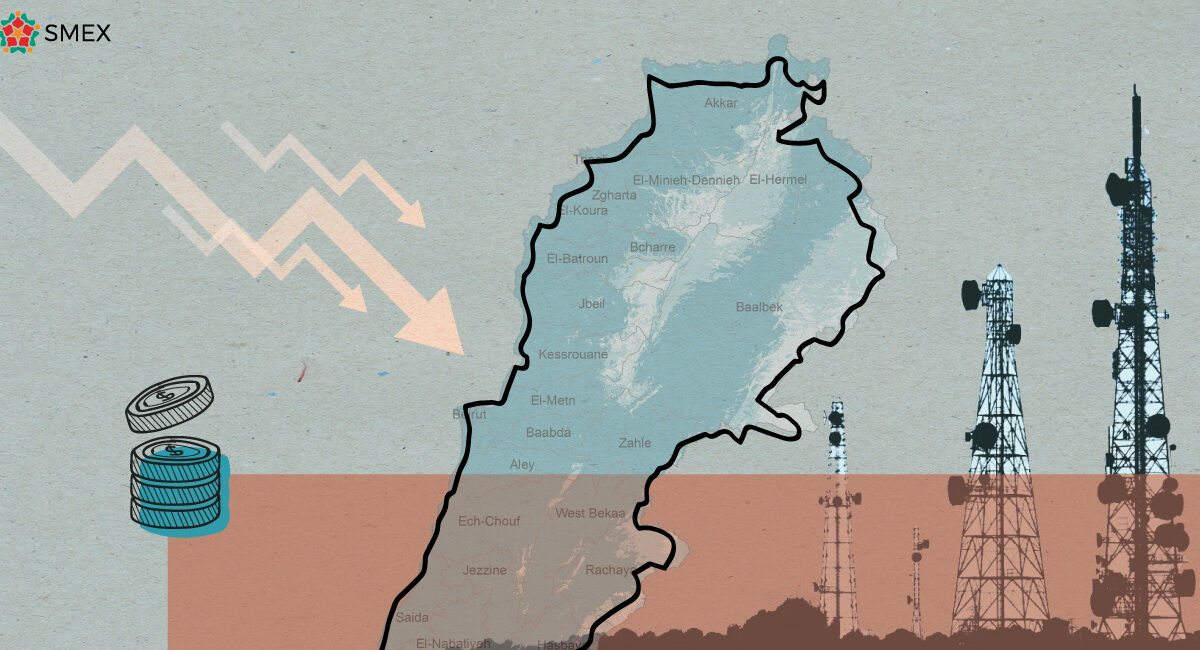Amid the real risk of the collapse of Lebanon’s telecommunications services, serious reports have recently emerged about massive squandering and intentional negligence in the sector.
According to a source interviewed by SMEX, the first scandal is the reluctance of public authorities to supply some of Ogero’s relay stations with Électricité du Liban (EDL) power, the official, state-backed electricity provider in Lebanon. Even when EDL electricity was available for nearby official buildings or facilities, it was cut off for Ogero’s stations.
Relay centers allow telecommunication services to cover regions further away from the source-stations. Without electric supply to these centers, residents in that region lose access to telecom services such as the internet and mobile signal.
Currently, EDL is providing Lebanese regions with four hours of electricity per day, but our source confirmed that authorities are refusing to supply relay stations with power, even if they are located near vital facilities that do receive state-supplied electricity for long periods every day. The source asked: “Is the government intentionally causing the collapse of the sector to sell more diesel? And who benefits from this?”
Telecom engineer Salloum El Dahdaah told SMEX: “Forcing relay stations to be dependent on diesel generators is unacceptable. These are vital facilities and the state should supply them with uninterrupted electricity. It should also ensure backup power sources for relay stations when the national grid is down.”
Power outages are the main reason why relay stations are going offline, which forces the Ministry of Telecom, Ogero, Alfa and Touch to use backup generators that consume large quantities of diesel, as confirmed repeatedly by Ogero’s Director-General Imad Kreidieh, who said that “Ogero is the second largest producer of electricity in the country.”
The second scandal, which received significant media coverage in early March, is that the government has been “forcing” Ogero to sell E1 lines for LBP 475,000 (approximately USD 4 at today’s exchange rate), while mobile operators Alfa and Touch, as well as other DSL distributors, are marking profits forty times higher because they sell their services in US dollars.
The reason is that Ogero cannot price its services independently, as only the Council of Ministers can set the prices, as confirmed by Ogero employees. An E1 link is a primary rate interface that can be divided into several channels.
Ogero is the backbone of Lebanon’s internet infrastructure and the main DSL and mobile Internet service provider. Its employees are on strike, demanding better wages after several unfulfilled promises from officials.
Operating Vital Facilities or Introducing New, Private Sector Actors?
Telecom Minister Johnny Corm, backed by Prime Minister Najib Mikati, attempted to involve the Lebanese Armed Forces (LAF), by having them forcibly open and operate the closed relay stations. However, several media reports confirmed that the LAF would not in fact operate the relay stations; rather, PM Najib Mikati and Telecom Minister Johnny Corm wanted the LAF to offer protection to a private company (PowerTech) to intervene and provide fuel for Ogero’s generators by force.
Last year, the Court of Audit, which is a government oversight authority, revealed that PowerTech had hired technicians and used vehicles belonging to Touch, and although the company received its dues in full, it turned out that the employees were receiving their salaries from Touch, not from PowerTech.
According to the Court of Audit’s report, which documented the squandering of billions of dollars in the telecom sector in Lebanon between 2010 and 2020, PowerTech signed a ten-year maintenance contract with Alfa in 2018 at the cost of USD 14 million annually. Then, in 2019, it signed a maintenance contract with Touch at the cost of USD 16 million annually. Afterward, the annual cost of Alfa’s contract with PowerTech rose to USD 6.8 million in maintenance fees, not to mention the USD 48 million paid for diesel, according to the report which was published in February of last year.
A few days after Ogero employees went on strike to demand a wage increase, relay stations across Lebanon shut down, impacting DSL and mobile internet services and leading to very slow speeds and an internet and telecommunications blackout in many places, especially remote regions.
However, employees at Ogero – the backbone for Lebanon’s internet infrastructure – explained that “the strike is not the cause of internet blackouts. The primary reason is the lack of liquidity to properly maintain telecom equipment and backup generators, as well as the lack of diesel to run these generators.”
In a press interview, some employees decried that “the Ministry is reluctant to repair diesel generators at Ogero relay stations or buy replacement parts for them, but it seemed very keen on soliciting the help of a private company and the LAF to undermine its employees further.”
Meanwhile, Telecom Minister Johnny Corm, backed by PM Najib Mikati, demanded that the strike be ended at any cost, calling upon the LAF to take control of relay stations. The Ogero Employees Union later responded by saying that it “welcomes the LAF” and that “all centers and offices are at its full disposal, from the headquarters to the last center across the country.”
Corm later tried to calm the situation by calling for a dialogue, adding that “financial decisions, such as disbursement and collection, are not within his powers as minister, but are rather entrusted to the Council of Ministers.”
While the minister and the PM are blaming the employees’ strike for the collapse, it should be noted that neither the Ministry of Telecommunications nor the government have developed any plan to protect or rationalize the sector or optimize the use of its revenues.
In fact, the Court of Audit’s report, which documented the squandering of billions of dollars in operational costs over the past ten years, was completely ignored, and no investigation was opened into the issues it highlighted. Instead, the minister and the government increased the prices of mobile services, leading to serious consequences for consumers. These additional revenues were not invested, and a large portion of them was spent on salaries, wages and promotions, especially for well-connected employees.
Raising telecom prices “largely affects the poorest and most vulnerable individuals who can no longer afford them, and even if they did they would receive low-quality services,” said journalist and human rights activist Chrystine Mhanna in an interview with SMEX. “An internet shutdown in Lebanon could seriously violate individuals’ rights.”
While the minister insists on raising prices according to the Sayrafa USD exchange rate on every occasion, Alfa and Touch have yet to offer adequate packages, leading to a drop in subscribers. In response, the minister stated that “Sayrafa affects the price of mobile services, which could have an impact on the number of subscribers and the rate of consumption. We will hold a meeting with the boards of Alfa and Touch to develop an emergency strategy if we notice a drop in the number of subscribers.”
According to El Dahdaah, the telecom sector brought in billions of dollars to the state’s treasury, “but a large part of these funds were squandered on events, dinner parties, associations and even political parties, rather than being used to improve the infrastructure.”
Internet Shutdown Poses a “Serious Threat”
Internet services are not only vital for communication; they have also become necessary for all aspects of life. Therefore, “an internet shutdown could have unimaginable consequences and should be prevented at all costs,” according to El Dahdaah.
The telecom engineer hopes that the telecom and internet sector would recover, especially since it “is a significant source of hard currency and allows many people to work without having to leave Lebanon.”
However, in case of an internet shutdown, “even searching for jobs outside Lebanon would become more difficult,” according to Mhanna, “as even people who are currently working remotely, such as journalists, could lose their jobs or their ability to deliver information to people through these platforms.”
In addition, a complete blackout in the internet sector would “undermine human rights, such as the right to communicate, to work, to access information and to entertainment, as well as the ability to detect and monitor violations.”
The Ministry of Telecommunications, the Lebanese government and all relevant officials should develop strategic plans to ensure continued access to the internet, which is a basic and vital service, rather than continue to take impromptu measures. They should also rationalize the sector and fight corruption to avoid a complete blackout, which would lead to enormous economic losses and would exacerbate human rights violations.



